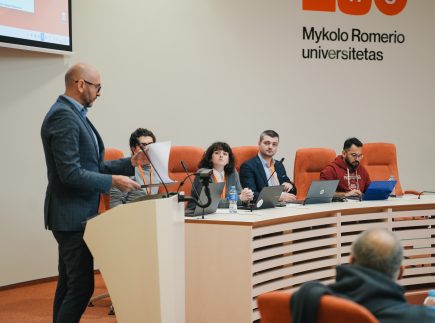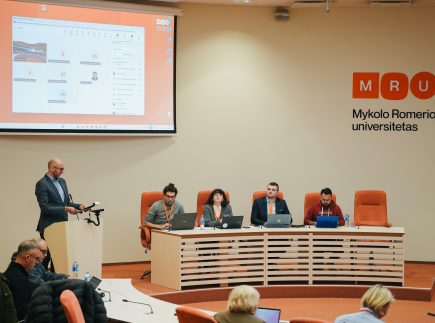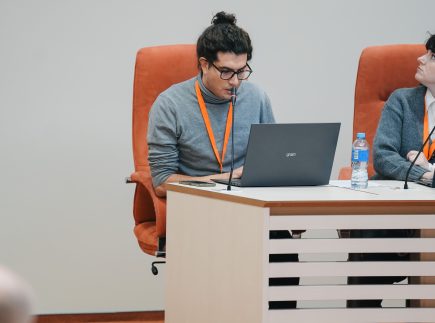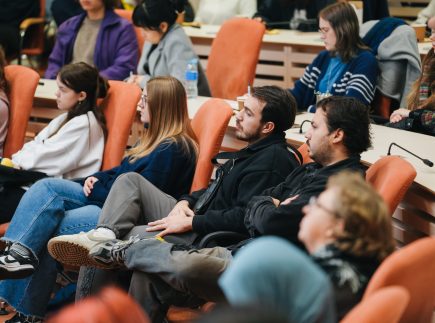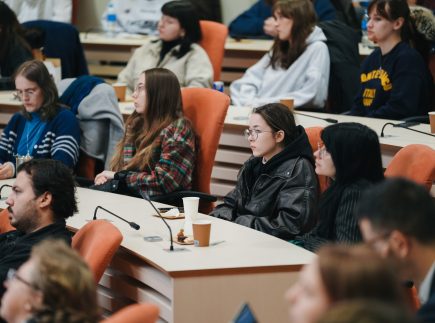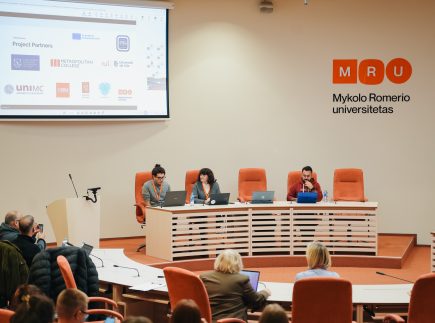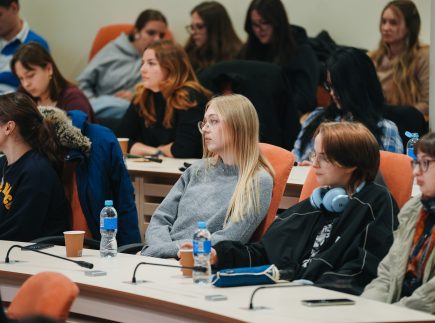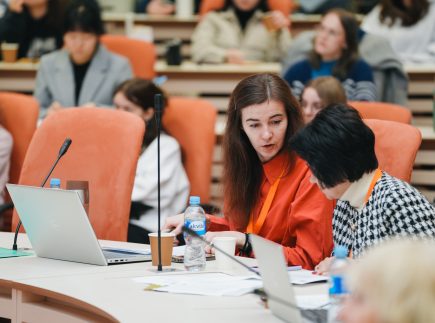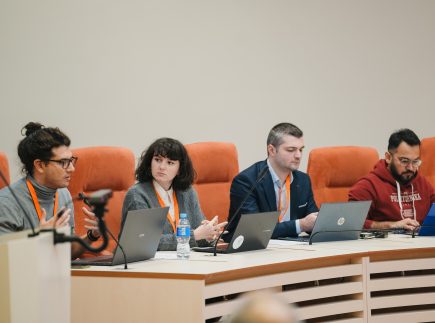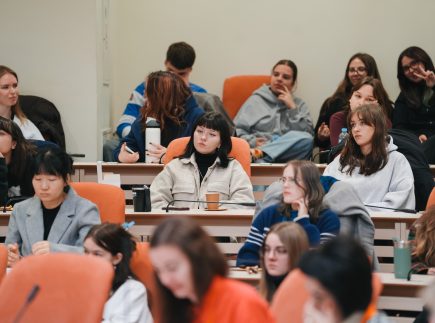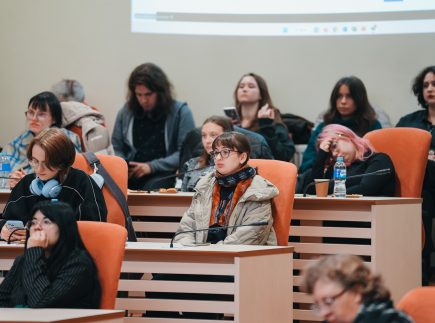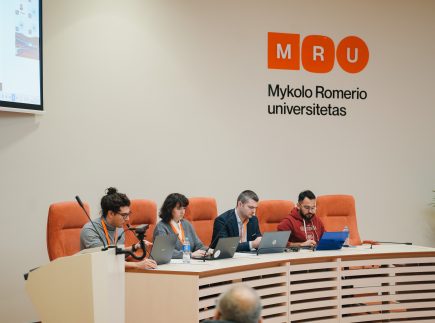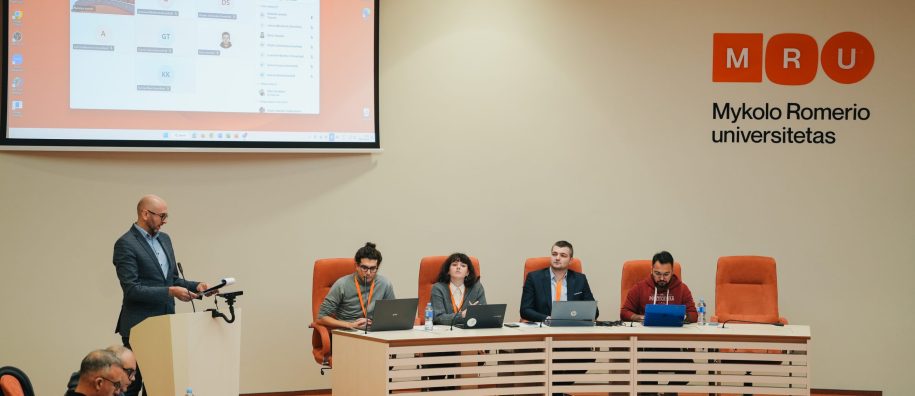
On October 21, 2025, the Institute of Humanities at Mykolas Romeris University (MRU) hosted the final international conference “STEM4HUMANITIES-ISC2025: STEM4Humanities for Innovation and Social Change” of the Erasmus+ project “STEM Skills for the Humanities.” The event brought together academics, researchers, and educators from across Europe and beyond to share insights on how integrating STEM (Science, Technology, Engineering, and Mathematics) into humanities education can shape the future of learning, work, and society.
An International Gathering for Interdisciplinary Dialogue
The conference marked the culmination of a three-year Erasmus+ initiative that explored how cross-disciplinary teaching and learning can strengthen innovation and employability in higher education. Participants from Lithuania, Italy, Greece, Georgia, Poland, Ukraine, and Pakistan gathered to discuss how technology and the humanities can complement rather than compete with each other.
The conference opened with a welcome speech from Prof. Dr. Linas Selmistraitis, Vice-Dean for Studies at the Faculty of Human and Social Studies at MRU, who emphasized the growing importance of bridging disciplinary divides. He highlighted how the STEM4Humanities project had encouraged new collaborations between teachers, students, and institutions, fostering an exchange of ideas that transcend traditional academic boundaries.
Keynote on Global Learning and Collaboration
The keynote presentation was delivered by Assoc. Prof. Dr. Ana Balula, Associate Professor at the University of Aveiro (Portugal) and an expert in digital education and global learning. Her talk, “Synergizing STEM and Humanities Education: A Global Learning Approach,” focused on how Collaborative Online International Learning (COIL) can foster intercultural understanding, critical thinking, and interdisciplinary collaboration among students from different countries.
Prof. Dr. A. Balula highlighted that, in an era defined by rapid technological change and global interconnectivity, higher education must empower students to engage with both scientific and humanistic perspectives. She argued that COIL projects — which bring together students and educators from around the world through digital platforms — offer a sustainable way to internationalize the curriculum and promote equity in global education.
Project Results and Partner Contributions
Following the keynote, representatives from the STEM4Humanities consortium presented their results and experiences from the project’s implementation phase.
- Andrea Bruscia (University of Macerata, Italy) discussed the evolution of teaching STEM to humanities students and the impact of interdisciplinary education on collaboration with small businesses.
- Maria Botikopoulou (Innovation Hive, Greece) shared insights into innovative STEM training schemes designed for humanities learners.
- Grigol Kalandadze (Georgian International University, Georgia) presented the institution’s progress in applying the project’s methods at national level.
- Yash Chawla (Wroclaw University of Science and Technology, Poland) addressed the need for integrating social sciences and humanities into the development of responsible technologies.
- A team from Ivan Franko National University of Lviv (Ukraine) — Oleksandra Antoniv, Nina Stankevych, Nataliia Faryna, and Iryna Zbyr — presented their experiences in equipping humanities students with practical STEM skills.
- Kamaleddin Aghaloo (MRU, Lithuania) explored the intersection of STEM and communication in his presentation “From Models to Meaning: Bridging STEM and Humanities for Communicative and Participatory Climate-Resilient Planning.”
- Zoia Adamia (Georgian-Ukrainian Institute of Languages and Culture, Georgia) shared post-project initiatives that use the STEM4Humanities framework to support the social and educational inclusion of Ukrainian refugees in Georgia.
Interdisciplinary Discussions and Emerging Themes
The afternoon sessions, moderated by Prof. Dr. Sigita Rackevičienė, Professor at Institute of Humanities Professor, featured dynamic discussions on employability, AI in education, and the future of work. Presentations explored how transversal and digital skills are increasingly essential for graduates entering diverse job markets.
Among the Lithuanian participants, Eglė Selevičienė presented findings on students’ acceptance of AI-based writing tools such as ChatGPT, while Viktorija Pulina discussed how automation and technological advancement are transforming labour markets. Meanwhile, Olga Usinskienė, Assistant at Institute of Humanities, and Sigita Rackevičienė showcased their work on compiling a bilingual migration corpus using Sketch Engine, demonstrating how linguistic research can benefit from digital tools traditionally associated with STEM disciplines.
A Shared Vision for the Future of Education
The conference underscored a shared vision: education must be both human-centered and technologically informed. By bringing together scholars from a wide range of disciplines, the event highlighted how integrating STEM skills into the humanities can promote critical thinking, creativity, and social responsibility — competencies essential for addressing global challenges.
As the final multiplier event of the Erasmus+ STEM4Humanities project, the conference marked not an end but a beginning — inspiring new collaborations and research directions. Participants expressed optimism that the project’s outcomes will continue to shape teaching practices and institutional strategies across Europe.
Legacy and Next Steps
The STEM4Humanities project has provided valuable tools, training resources, and models that can be adopted by universities seeking to modernize their curricula. Through its emphasis on innovation, interdisciplinarity, and inclusion, the project demonstrates that the future of education lies in connecting the analytical power of STEM with the reflective depth of the humanities.
For more information about the project and its outcomes, visit the official website.
